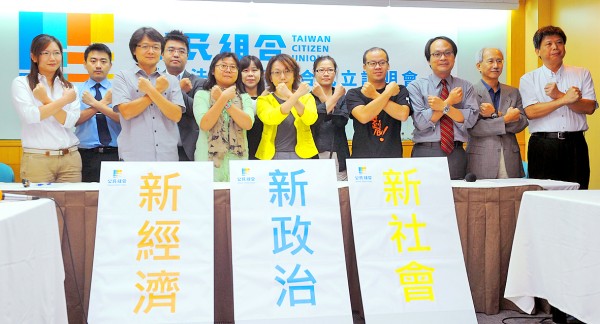《TAIPEI TIMES 焦點》 New civic group vows to overhaul political system

Members of the Taiwan Citizen Union hold their inaugural press conference in Taipei yesterday, promising to promote civic engagement. Photo: Wang Min-wei, Taipei Times
ON A MISSION: Taiwan Citizen Union cofounder Lin Feng-cheng said the group, which is to be a political party, bids to stop political hegemony and reform electoral processes
By Lii Wen and Loa Lok-sin / Staff reporters
Established by prominent activists on a platform of civic engagement, the Taiwan Citizen Union (TCU) held its inaugural conference in Taipei yesterday, announcing plans to register as a political party after the Nov. 29 nine-in-one elections.
The group has stated its intentions to field candidates for the 2016 legislative elections in a bid to prevent either major political camp from gaining a majority.
Fan Yun (范雲), a professor of sociology at National Taiwan University who was selected to be the first president of the union, said the group aims to achieve political reform through the promotion of direct civic engagement. Social justice and economic equality are also listed among the group’s objectives.
In a written endorsement of the group, former Democratic Progressive Party (DPP) chairman Lin I-hsiung (林義雄) backed Fan’s assertion that electoral politics have lost accountability in reflecting the needs of society.
Lin Feng-cheng (林峰正), former chief executive director of the Judicial Reform Foundation and one of the union’s founders, said that although Lin I-hsiung is a staunch supporter of the nascent group, he will not be involved in its operations.
The group counts Academia Sinica researcher and prominent Sunflower movement leader Huang Kuo-chang (黃國昌) in its ranks, leading to speculation on whether other Sunflower leaders such as Lin Fei-fan (林飛帆) or Chen Wei-ting (陳為廷) might join.
Fan said that while Lin Fei-fan and Chen are friends with many union members, they have yet to make a decision on running as candidates, although the group aims to strive to work with the pair.
Given the union’s platform on political reform, Lin Feng-cheng said that it would experiment with new methods of nominating candidates for elections.
“We have an unavoidable mission to reform the process of nominating electoral candidates,” he said, adding that: “Currently, political parties usually appoint their candidates based on the will of a small circle of people. The general public, or even ordinary party members, usually have no say in the decision.”
Regarding the group’s goal of preventing any major party from establishing a hegemony, Fan Yun said that throughout the history of the legislature, the Chinese Nationalist Party (KMT) and the pan-blue camp have always held a majority.
“After all, the legislature is where many major decisions on political reform are made. If we could change this long-term stance of pan-blue power concentrated in the legislature, perhaps it would have a lasting effect on reform,” Fan said, adding that the group’s possible effects on the DPP’s election performance remained to be seen.
Lin Feng-cheng said the group would not take any particular stance on the Nov. 29 elections.
“While individual members of the TCU could lend their support to candidates, the group would remain focused on the 2016 legislative elections,” he said.
Meanwhile, when asked to comment on the TCU’s founding, DPP Chairperson Tsai Ing-wen (蔡英文) said her party and the group will not be rivals, but partners in reform.
“I know that, recently, people have made a lot of comments about the DPP and many non-governmental groups have criticized us,” Tsai said on the sidelines of a campaign event for DPP Changhua County commissioner candidate Wei Ming-ku (魏明谷). “But I believe that the intentions behind all these critiques are good and we will certainly examine ourselves.”
“The DPP and civic groups have a partner relationship: We have different roles, but we hope that, while playing different roles, we can move toward a shared objective, so we can work hard to fight for Taiwan together,” she added.
Tsai said that three large pictures hanging in DPP headquarters pay homage the party’s history and its founders, and that “these pictures serve as reminders that the DPP has come such a long way because of the support of the public, and it is the will of the people and of its members that the party forward.”
“If the DPP is to move forward, we must remember to stand alongside the public,” Tsai said.
新聞來源:TAIPEI TIMES















